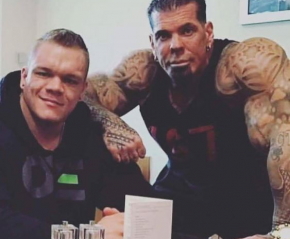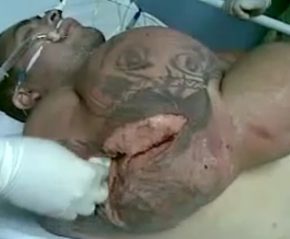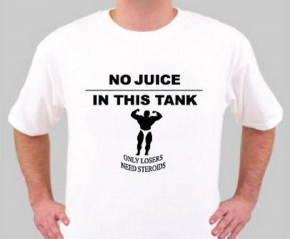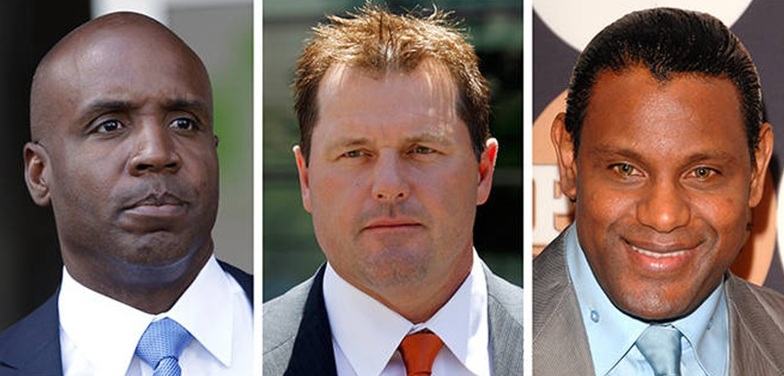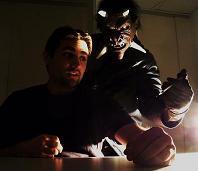SHUT OUT!
Update: July 18, 2011
Jon Paul Morosi explains the effect of the Steroid Era on Hall of Fame voting.
Share This Story
Updated Jan 9, 2013 6:26 PM ET
Steroid-tainted stars Barry Bonds, Roger Clemens and Sammy Sosa were denied entry to baseball’s Hall of Fame, with voters failing to elect any candidates for only the second time in four decades.
A candidate must receive 75 percent of the vote from the voting members of the Baseball Writers’ Association of America in order to be inducted.
In totals announced Wednesday by the Hall and the BBWAA, Bonds, baseball’s only seven-time Most Valuable Player, received 36.2 percent of the vote. Clemens, the only seven-time Cy Young Award winner got 37.6 percent; Sammy Sosa received just 12.5 percent. They were appearing on the ballot for the first time and have up to 14 more years to make it to Cooperstown.
Bonds is the sport’s season and career home run leader. Clemens is third in career strikeouts and ninth in wins. ”It is unimaginable that the best player to ever play the game would not be a unanimous first-ballot selection,” said Jeff Borris of the Beverly Hills Sports Council, Bonds’ longtime agent.
Craig Biggio, 20th on the career list with 3,060 hits, topped the 37 candidates with 68.2 percent of the 569 ballots, 39 shy of the 75 percent needed.
The voters also shunned first-time candidates Mike Piazza (57.8 percent) and Curt Schilling (38.8 percent). Jack Morris led holdovers with 67.7 percent. He will make his final ballot appearance next year, when fellow pitchers Greg Maddux and Tom Glavine along with slugger Frank Thomas are eligible for the first time.
Morris increased slightly from his 66.7 percent last year, when Barry Larkin was elected. The ace of three World Series winners, Morris finished with 254 victories and was the winningest pitcher of the 1980s. His 3.90 ERA, however, is higher than that of any Hall of Famer.
Morris could become the player with the highest-percentage of the vote who is not in the Hall, a mark currently held by Gil Hodges at 63 percent in 1983.
Several players who fell just short in the BBWAA balloting later were elected by either the Veterans Committee or Old-Timers’ Committee: Nellie Fox (74.7 percent on the 1985 BBWAA ballot), Jim Bunning (74.2 percent in 1988), Orlando Cepeda (73.6 percent in 1994) and Frank Chance (72.5 percent in 1945). Several other holdovers from last year remained on the 37-player ballot, including Jeff Bagwell (59.6 percent), Lee Smith (47.8 percent) and Tim Raines (52.2 percent). Two-time NL MVP Dale Murphy received 18.6 percent in his 15th and final appearance.
”Next year, I think you’ll have a rather large class and this year, for whatever reasons, you had a couple of guys come really close,” Commissioner Bud Selig said at the owners’ meetings in Paradise Valley, Ariz. ”This is not to be voted to make sure that somebody gets in every year. It’s to be voted on to make sure that they’re deserving. I respect the writers as well as the Hall itself. This idea that this somehow diminishes the Hall of baseball is just ridiculous in my opinion.” About 600 people are eligible to vote in the BBWAA election, all members of the organization for 10 consecutive years at any point.
It was the eighth time the BBWAA failed to elect any players. There were four fewer votes than last year and five members submitted blank ballots.
http://msn.foxsports.com/mlb/story/hall-of-fame-class-of-2013-barry-bonds-roger-clemens-no-inductees-ignites-debate-goodthing010613http://msn.foxsports.com/mlb/story/hall-of-fame-class-of-2013-barry-bonds-roger-clemens-no-inductees-ignites-debate-good-thing-010613
HALL’S FAIR
Ken Rosenthal says it’s actually a good thing that nobody was voted into the HOF this year. ”The standards for earning election to the Hall of Fame have been very high ever since the rules were created in 1936,” Hall of Fame President Jeff Idelson said. ”We realize the challenges voters are faced with in this era. The Hall of Fame has always entrusted the exclusive voting privilege to the baseball writers. We remain pleased with their role in evaluating candidates based on the criteria we provide.”
The previous two times the writers didn’t elect a candidate were when Yogi Berra topped the 1971 vote by appearing on 67 percent of the ballots cast and when Phil Niekro headed the 1996 ballot at 68 percent. Both were chosen the following years when they achieved the 75 percent necessary for election. The BBWAA election rules say ”voting shall be based upon the player’s record, playing ability, integrity, sportsmanship, character, and contributions to the team(s) on which the player played.”
Bonds has denied knowingly using performance-enhancing drugs and was convicted of one count of obstruction of justice for giving an evasive answer in 2003 to a grand jury investigating PEDs. Clemens was acquitted of perjury charges stemming from congressional testimony during which he denied using PEDs.
http://msn.foxsports.com/mlb/story/mlb-hall-of-fame-ballot-jack-morris-craig-biggio-jeff-bagwell-should-allow-votes-for-more-than-10-players-010712http://msn.foxsports.com/mlb/story/mlb-hall-of-fame-ballot-jack-morris-craig-biggio-jeff-bagwell-should-allow-votes-for-more-than-10-players-010712
SQUEEZE IS ON
Unless the rules change, Hall of Fame will snub deserving players, Jon Paul Morosi says. Sosa, who finished with 609 home runs, was among those who tested positive in MLB’s 2003 anonymous survey, The New York Times reported in 2009. He told a congressional committee in 2005 that he never took illegal performance-enhancing drugs.
An Associated Press survey of 112 eligible voters conducted in late November after the ballot was announced indicated Bonds, Clemens and Sosa would fall well short of 50 percent. The big three drew even less support than that as the debate raged over who was Hall worthy.BBWAA president Susan Slusser of the San Francisco Chronicle said she didn’t vote for Bonds, Clemens or Sosa.
”The evidence for steroid use is too strong,” she said.
As for Biggio, ”I’m surprised he didn’t get in.”
MLB.com’s Hal Bodley, the former baseball columnist for USA Today, said Biggio and others paid the price for other players using PEDs.
”They got caught in the undertow of the steroids thing,” he said.
Bodley said this BBWAA vote was a ”loud and clear” message on the steroids issue. He said he couldn’t envision himself voting for stars linked to drugs.
http://msn.foxsports.com/mlb/lists/Baseball-oldest-living-Hall-of-Famershttp://msn.foxsports.com/mlb/lists/Baseball-oldest-living-Hall-of-Famers
OLD TIMERS
Today’s game was shaped by the greats of days gone by. Learn about the oldest living Hall of Famers.
”We’ve a forgiving society, I know that,” he said. ”But I have too great a passion for the sport.” Mark McGwire, 10th on the career home run list, received 16.9 percent on his seventh try, down from 19.5 last year. He received 23.7 percent in 2010 — a vote before he admitted using steroids and human growth hormone. Rafael Palmeiro, among just four players with 500 homers and 3,000 hits along with Hank Aaron, Willie Mays and Eddie Murray, received 8.8 percent in his third try, down from 12.6 percent last year. Palmeiro received a 10-day suspension in 2005 for a positive test for performance-enhancing drugs, claiming it was due to a vitamin vial given to him by teammate Miguel Tejada.
The election leaves the Hall without both baseball’s career home run leader and its all-time hits king, Pete Rose. There were four write-in votes for Rose, who never appeared on the ballot because of his lifetime ban that followed an investigation of his gambling while manager of the Cincinnati Reds.
Major League Baseball Players Association executive director Michael Weiner issued the following statement regarding the results: “Today’s news that those members of the BBWAA afforded the privilege of casting ballots failed to elect even a single player to the Hall of Fame is unfortunate, if not sad. Those empowered to help the Baseball Hall of Fame and Museum document the history of the game failed to recognize the contributions of several Hall of Fame worthy players.
http://msn.foxsports.com/mlb/lists/Barry-Bonds-through-the-years-legacy-041311http://msn.foxsports.com/mlb/lists/Barry-Bonds-through-the-years-legacy-041311
TAKE STOCK OF BONDS
From skinny rookie to baseball’s home run king to convicted felon. See the slugger’s life in pictures.
“To ignore the historic accomplishments of Barry Bonds and Roger Clemens, for example, is hard to justify. Moreover, to penalize players exonerated in legal proceedings — and others never even implicated — is simply unfair. The Hall of Fame is supposed to be for the best players to have ever played the game. Several such players were denied access to the Hall today. Hopefully this will be rectified by future voting.”
Three inductees were chosen last month by the 16-member panel considering individuals from the era before integration in 1946: Yankees owner Jacob Ruppert, umpire Hank O’Day and barehanded catcher Deacon White. All have been dead since at least 1939. They will be enshrined during a ceremony in Cooperstown on July 28. More than 40 living Hall of Famers are expected to attend the induction ceremony, but the attendance at Cooperstown, NY, could fall below 10,000, the approximate number who attended the 1996 ceremony. It certainly won’t approach the record 75,000 who saw Tony Gwynn and Cal Ripken Jr. inducted in 2007.
Photo and complete article courtesy of msn.foxsports.com
Administrator
